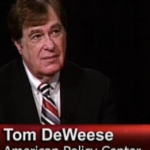USDA and Corporate Agribusiness Continue to Push Animal ID Scheme
Consumers and Independent Producers Lose if Big Ag Wins on Animal Traceability
Source: The Cornucopia Institute, Mark Kastel – June 21, 2011
WASHINGTON, DC — The U.S. Department of Agriculture (USDA) is expected to issue its new proposed rule for mandatory animal traceability very shortly. While USDA already has traceability requirements as part of existing animal disease control programs, the proposed framework goes much further to require animal tagging and tracing even absent any active disease threat. The framework has raised significant concerns among family farm and ranch advocates, who criticize the agency for failing to provide a coherent, factual explanation for the new program’s necessity.
“USDA brags about the success of past programs, but has abandoned the principles that made them successful,” argued Bill Bullard of R-CALF USA. “Past programs were based on sound science and were developed in response to the transmission, treatment, and elimination of specific identified diseases. USDA’s new approach is a one-size-fits-all approach that does not specifically aim at the control of livestock diseases.”
The USDA has presented its traceability scheme as an animal health program, but it has also reiterated the importance of the export market to the United States in promoting its new plan. The powerful meatpacking lobby has continued to push for such mandated traceability requirements in order to develop international standards for exports. Critics have suggested this is not in the American public’s best interest, however, since the U.S. is a net importer of beef and cattle and the profits from the export market go to a small handful of massive meatpacking companies.
“Factory farms can easily absorb the added economic burdens, and the meatpacking industry stands to benefit from a marketing standpoint,” asserted Judith McGeary, a livestock farmer and executive director of the Farm and Ranch Freedom Alliance. “However, the extra expenses and labor will fall disproportionately on family farmers and ranchers, accelerating the loss of independent businesses to corporate industrial-scale producers.”
“Consumers need the USDA to start focusing on the animal health and food safety risks posed by industrialized meat production,” said Patty Lovera of Food & Water Watch. “If USDA devoted as much energy to preventing animal diseases as it has to promoting animal tracking, our food system would be in much better shape.”
Many cattle organizations agree that tracing breeding-age cattle may be appropriate for efficient disease control, but USDA’s proposal goes far beyond that by calling for the identification of every cow that crosses state lines, including feeder cattle that are processed at a young age. Because of the sheer numbers of feeder cattle, this requirement could unduly burden small ranchers and sales barns and further erode competition in the marketplace.
“The large volume of the animals that USDA proposes to track could overwhelm the capabilities of state agencies, making it impossible to retrieve useful data if there is in fact a disease outbreak,” stated Gilles Stockton, a Montana rancher and member of the Western Organization of Resource Councils.
Additionally, the centuries-old tradition of hot-iron branding cattle would be demoted from an official identification device. “The brand is a part of our ranching heritage and a long accepted method of animal identification,” stated Rep. Denny Rehberg, R-Mont, in a letter to USDA Secretary Tom Vilsack.
A coalition of farm, ranch and consumer groups urges citizens to contact their Congressional representatives and the USDA with their concern that mandatory animal traceability helps only a few giant corporations, at the expense of American family farmers and consumers.
“If Americans don’t want their food supply to cave like the banking and housing industries, it’s time to take action,” stated Mark Kastel of The Cornucopia Institute.- 30-
MORE
Additional contact information:
Judith McGeary, Farm and Ranch Freedom Alliance, 512-484-8821
Bill Bullard, R-CALF USA, 406-252-2516
Patty Lovera, Food & Water Watch, 202-683-2465
Gilles Stockton, Western Organization of Resource Councils, 406-366-4463
The Cornucopia Institute PO Box 126 Cornucopia, WI 54827 www.cornucopia.org



